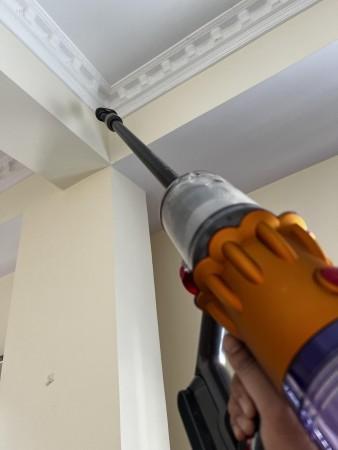With the change in the temperature and spotting fresh buds bloom, one knows that spring is just around the corner. But, so is the allergy season! Pollen, animal hair, shedding skin and open windows all contribute to a household's dust collection during spring months. Tom McVey, Associate Principal Engineer at Dyson, shares helpful tips on vacuuming to help boost your spring-cleaning regime.
In general, dust particles are mechanically and/or electrostatically 'stuck' to surfaces. A vacuum cleaner need to apply a force to the particles, for a certain time, in order to dislodge them and entrain them into the machine.

The force is supplied by the airflow from the machine, as well as the brush bar and cleaner head. The force can be increased by changing to higher suction settings, whereas the 'time' can be increased either by moving slower or completing more passes over an area.
However, different machines will perform differently depending on the surface they're used on. Owners will always need to balance the performance they want with the time it will take to get an optimum clean.

Some general tips one can use when using your vacuum:
1. Choose the right machine: Different vacuums are designed for different floor types and home sizes. For example, some machines will be engineered with hard floors in mind and will struggle on thick pile carpets. Choosing the right machine for your home will make a big difference to the ease and speed with which you're able to clean your home.
2. Use the right settings: Most machines have options depending on your floor type and user preferences that can optimise performance. On the Dyson V12 Detect Slim Total Clean, for example, our Boost mode is designed for ground-in dirt and debris and Eco mode is designed for general cleaning. Auto mode, however, takes this decision out of your hands and will intelligently adapt to the floor type you're using thanks to in-built micro-processors.
3. Use the right tool for the right job: It may take time, but making sure you choose the right cleaner head or accessory tool for the job can make a big difference to the performance and ease-of-use. Dyson machines normally come with several of the following:
- Multi-floor tools for great all-round cleaning, particularly good on carpets
- Powerful torque-drive heads that dislodge ground-in dirt from even deep-pile carpets
- Fluffy heads that excel at cleaning hard floors
- Mini-moto heads for cleaning stairs, cars, mattresses or upholstery
- Crevice tools for gaps and crevices, or hard to reach areas
- Soft dusting tools for delicate furniture
4. Vacuum slowly: Vacuuming more slowly gives the machine more time to remove the dirt, especially the ground-in dirt and debris and hidden dust. Dust is made up of a number of components, including dust mites, allergens, bacteria and viruses that can sit deep in soft furnishing and carpets.
5. Go over the same spot – but not too often: More passes over an area will also give the machine the best chance of cleaning well, but any more than two or three times gives minimal increase according to our research.
6. Vacuum 'little and often': Vacuuming frequently on areas that receive more footfall will help to stop dirt building up and getting trodden into your floor. Using a cord-free vacuum is helpful for this, as the versatile format means you don't have to spend time getting the machine out from a cupboard, plugging it in, moving it around and so on.
7. Look after your machine: Regularly maintaining your machine as per the instruction manual, such as washing filters and emptying the bin regularly, will ensure it does the best job for as long as possible – saving you time and money in the long term.

















